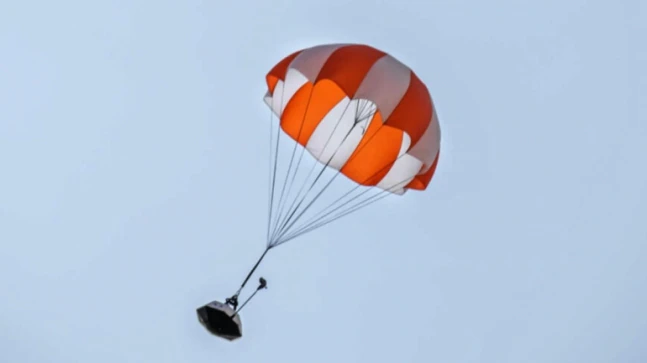US-based Inversion Space is working to develop a capsule that will act as a suitcase and deliver goods anywhere in the world from outer space.

The company has developed a reusable capsule that will be capable of conducting round trips to space. (Photo: Invesrion Space)
From packers and movers to cargo aircraft to drone deliveries, the world is headed in a new direction for the doorstep delivery of goods. A new startup company has bigger plans than a plane and a drone — a space capsule to deliver goods across the world. Dubbed Inversion, the year-old company is developing a capsule to deliver goods anywhere in the world from outer space.
Based in Los Angeles, the startup raised $10 million in 2021 in seed funding to develop a re-entry capsule to return goods from space to Earth. The company wants to build the first high cadence return vehicle for the commercial and defense industries that can provide global delivery of supplies and aid Space Station resupply and return.
The company has developed a reusable capsule that will be capable of conducting round trips to space and not only returning but also delivering goods to the International Space Station. With Nasa planning to ramp up launches and private players emerging as the drivers of space exploration in the new decade, the reusable capsule could find a major chunk of business in the new space market.
The company is working to develop a capsule four feet in diameter that will carry a payload equivalent to the size of a few carry-on suitcases. The planned timeline for the development is 2025, however, before that, the engineers are testing 1.5-foot diameter capsule dubbed Ray that will act as a technology demonstrator.

Inversion recently conducted a parachute test for Ray. (Photo: Inversion)
Inversion recently conducted a parachute test for Ray, when it tossed the saucer-like object out of an aircraft flying at 30,000 feet. When fully developed, the spacecraft will hit Earth’s upper atmosphere 25 times as fast as the speed of sound, relying on those parachutes for a soft landing.
The company told The New York Times that once in orbit, the capsule could navigate itself to a private commercial space station or stay in orbit powered by solar panels until commanded to return to earth. Inversion will demonstrate the technology with a small capsule in 2023.
With private players entering the space arena and launch costs going down, the company is hopeful that they will one day be able to launch and maintain hundreds or thousands of containers in orbit for a period of up to five years. The demand for cargo transporters to space are set to boost as private space stations comes up in Low Earth Orbit.
Inversion hopes to pitch to both private and government based on requirements and the capsule has been designed to be able to launch on any commercial vehicle.
Credit: Source link



